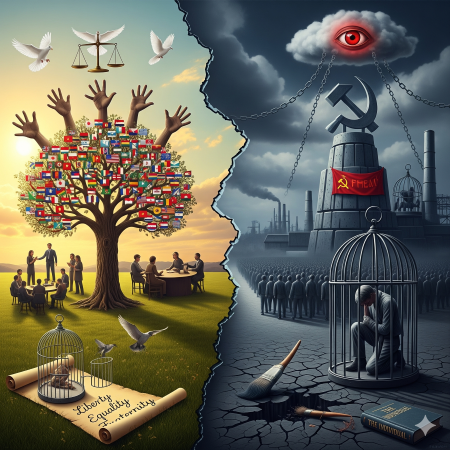How does democracy sometimes lead to political gridlock, inefficiency, or slow decision-making?

Democracy's emphasis on checks and balances, minority rights, and public debate can sometimes lead to political gridlock, inefficiency, and slow decision-making.
While these features are intended to prevent a concentration of power and protect individual freedoms, they can also complicate the process of passing legislation and implementing policy.
Checks and Balances-
The separation of powers, a core democratic principle, can be a major source of inaction.
-
Divided Government: When different political parties control the legislative and executive branches, it can lead to a state of divided government. In this situation, the opposing parties have an incentive to block each other's agendas, making it difficult to pass laws, approve budgets, or confirm appointments. This often results in legislative stagnation and a lack of policy reform.
-
Bicameralism: Many democracies, like the United States and Italy, have bicameral legislatures with two houses (e.g., the House of Representatives and the Senate). For a bill to become law, it must pass through both chambers, which can be controlled by different parties or have different interests. This creates multiple "veto points" where legislation can be stalled or killed.
Protection of Minority Rights-
Mechanisms designed to protect minority rights can also be used to obstruct the majority's will.
-
Filibuster: In some legislative bodies, like the U.S. Senate, a minority of lawmakers can use procedural tools like the filibuster to delay or block a vote on a bill. This can effectively give a minority party a veto power over legislation, forcing the majority to either compromise or abandon its agenda.
-
Coalition Governments: In multi-party parliamentary systems, no single party may win an outright majority, requiring the formation of a coalition government. These coalitions are built on compromise and often require a consensus among multiple parties with different platforms, which can lead to slow and watered-down decision-making as each party's demands must be met. The collapse of a coalition can trigger new elections and further political instability.
Public and Judicial Scrutiny-
The democratic emphasis on transparency and legal process can also slow things down.
-
Public Debate and Deliberation: The need for extensive public debate, deliberation, and compromise on major issues can be a lengthy process. While this is crucial for ensuring laws are well-considered and have broad public support, it can prevent quick action, especially on urgent issues.
-
Judicial Review: An independent judiciary has the power of judicial review, allowing it to strike down laws that are deemed unconstitutional. While this is an essential check on government power, it can halt the implementation of policies and introduce significant delays.
- Questions and Answers
- Opinion
- Motivational and Inspiring Story
- Technology
- Live and Let live
- Focus
- Geopolitics
- Military-Arms/Equipment
- Sécurité
- Economy
- Beasts of Nations
- Machine Tools-The “Mother Industry”
- Art
- Causes
- Crafts
- Dance
- Drinks
- Film/Movie
- Fitness
- Food
- Jeux
- Gardening
- Health
- Domicile
- Literature
- Music
- Networking
- Autre
- Party
- Religion
- Shopping
- Sports
- Theater
- Health and Wellness
- News
- Culture

